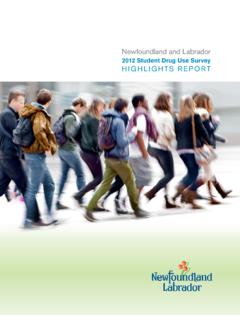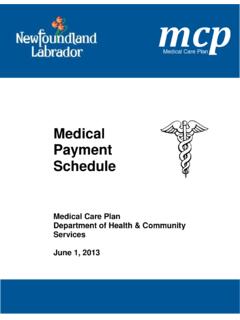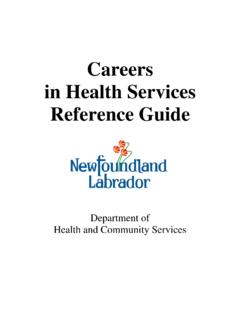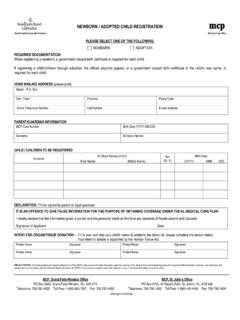Transcription of Action Plan for Newfoundland and Labrador - …
1 The Way Forward Towards Recovery: The Mental Health and Addictions Action Plan for Newfoundland and Labrador 2. Table of Contents 2. 3. Vision and 5. 6. Recovery and Well-Being 9. Implementation 9. Policy 10. Promotion, Prevention and Early 11. Focusing on the 11. Improving Service Access, Collaboration and Continuity of 11. Including all People 11. Accountability and Performance 12. Building on Ongoing 13. 13. Appendix A: Recommendations, Timelines and 14. Short-Term Recommendations (by March 2018).. 14. Medium-Term Recommendations (by March 2021).. 17. Long-Term Recommendations (by March 2022).. 20. 1. Introduction In March 2017, the All-Party Committee on Mental Health and Addictions released Towards Recovery: A Vision for a Renewed Mental Health and Addictions System for Newfoundland and Labrador . The report outlined 54. recommendations that address service gaps and support what is currently working well in the mental health and addictions system in the province.
2 System transformation is a high priority for Newfoundlanders and Labradorians and a priority that requires immediate Action in order to better meet the needs of residents. In the Way Forward: A vision for sustainability and growth in Newfoundland and Labrador , the Provincial Government committed to responding immediately to the recommendations to address gaps in the mental health and addictions system, strengthen existing programs and services, and break down the barriers of stigma and timely access. In doing so, it committed to developing and publicly releasing an implementation plan for the report recommendations by June 30, 2017. The goal of this plan is to guide the implementation of the recommendations outlined in Towards Recovery, and provide direction for mental health and addictions policy and programs for the next five years (2017 to 2022). With leadership from the Department of Health and Community Services, guided by the vision for a renewed mental health and addictions system, and with input from multiple partners, a provincial mental health and addictions program will be developed.
3 This comprehensive, evidence based, integrated, person-centered system that provides the right care, at the right time and in the right place, will be implemented in collaboration between community groups, government departments and the regional health authorities. The plan is consistent with and will be linked to the Department of Health and Community Services' Strategic Plan (2017-2020). One of the five strategic focus areas in the Department's Strategic Plan is focused solely on improving mental health and addictions, and includes a number of actions to be taken over the next four years that align with the recommendations in this plan. 2. Background In January 2015, as a result of a private member's motion passed unanimously in the House of Assembly, the All-Party Committee on Mental Health and Addictions was established. The Committee conducted a full review of the provincial mental health and addictions system to identify gaps in services and areas for improvement.
4 The Committee heard from people throughout Newfoundland and Labrador who have experienced mental illness and addictions, their loved ones, advocates, community agencies, Indigenous communities, regional health authorities, health care providers and the public. The culmination of consultation, review, and analysis was the release of Towards Recovery: A Vision for a Renewed Mental Health and Addictions System for Newfoundland and Labrador . 3. In addition to setting the overall policy direction for mental health and addictions for the next five years, the Provincial Government is addressing specific concerns in the system. In November 2016, federal, provincial and territorial health ministers, including the Newfoundland and Labrador Minister of Health and Community Services, released a Joint Statement of Action to Address the Opioid Crisis in response to the serious and growing opioid crisis in Canada. The Department of Health and Community Services is also implementing a provincial Opioid Action Plan, which includes: Development of a safe prescribing course in partnership with the College of Physicians and Surgeons of Newfoundland and Labrador and Memorial University's Faculty of Medicine.
5 New regulatory standards from the Newfoundland and Labrador Pharmacy Board requiring all pharmacies to be connected to the Provincial Pharmacy Network;. Development of a province-wide Prescription Monitoring Program;. Proclamation of secure withdrawal management legislation for youth with addiction;. Improving access to effective treatment options including suboxone as an alternative to methadone; and, Development of a provincial public awareness and education program on opioids. In order to transform the mental health and addictions system in the province, a comprehensive provincial program is required. Presently, four regional health authorities provide mental health and addictions programs and services, supplemented by other health care providers and community agencies. This plan will establish a comprehensive integrated mental health and addictions program and set the policy direction over the next five years. 4. Vision and Values The following vision and values will guide both the implementation of the recommendations and the delivery of mental health and addictions services in the province.
6 Vision: A province that promotes positive mental well-being and resilience and supports individuals and families with lived experience of mental illness and addiction to live full and rewarding lives. Respectful: Service delivery must be sensitive, compassionate and free from stigma and discrimination. Person-centered: Priority in the development and delivery of services and treatment must be given to meeting the person's needs. People must be encouraged and allowed to be partners in planning their own care. Accessible: Appropriate services must be available when needed and as close to home as possible. Recovery-focused: Programs and services must instill hope and empower people to seek mental health and well- being. Collaborative: Government, community agencies, health care providers and individuals and families share responsibility for improving service delivery. Effective and Efficient: Service delivery must be evidence-based and sustainable.
7 Services must be regularly monitored and evaluated to ensure the best possible health outcomes with the best use of resources. Responsive: Appropriate screening and assessment must be accessible at the first sign of a mental health or addictions issue. Inclusive: Services must accommodate the needs of all people. The vision and values outlined in this document are consistent with the broader vision of the Way Forward: A vision for sustainability and growth in Newfoundland and Labrador , and its focus on delivering better services, greater efficiency, and better outcomes. 5. Governance System transformation will require the combined effort of all of government, working closely with the regional health authorities, health care providers, individuals and families with lived experience, and community agencies. The provincial mental health and addictions program will be supported by a proposed governance structure that represents all partners, and ultimately reports to the Minister of Health and Community Services.
8 The Mental Health and Addictions Provincial Program Executive Committee (the Executive Committee), comprised of the Deputy Minister of Health and Community Services and the Chief Executive Officers of the four regional health authorities and the Newfoundland and Labrador Centre for Health Information, will report directly to the Minister of Health and Community Services. These executive leaders in the health care system will provide organizational direction to the Mental Health and Addictions Provincial Program Implementation Team (the Implementation Team) and provide advice to the Minister on mental health and addictions program and policy decisions. The Implementation Team, comprised of senior mental health and addictions staff at the Department of Health and Community Services and the regional health authorities, will provide the oversight and approval for the planning and program work of eight project teams, and operationalize the governance structure.
9 The Implementation Team will oversee and approve proposals, work plans, indicator development, progress updates and other reports from the project teams. The Implementation Team will also be responsible for the performance monitoring and evaluation of the Implementation Plan through the project teams and will prepare and submit progress updates to the Executive Committee, which will then be forwarded to the Mental Health and Addictions Advisory Council and a newly formed Recovery Council. The Provincial Mental Health and Addictions Advisory Council (the Advisory Council) will revise its mandate to include a performance monitoring function by providing oversight for the implementation of the 54 recommendations and providing advice on the progress to the Minister of Health and Community Services. The Advisory Council will continue to fulfill its mandate to advise the Minister of Health and Community Services on key mental health and addictions matters needed to formulate effective policy and decision making.
10 Members of the Advisory Council bring diverse backgrounds, knowledge and experience in the area of mental health and addictions, including community service providers, advocates, social activists, health care providers, family members and persons with lived experience. In addition to the Advisory Council, the Recovery Council, comprised of individuals with lived experience of mental illness and/or an addiction, will also have a performance monitoring function, will report directly to the Minister of Health and Community Services and will provide advice on the implementation of the recommendations, and other mental health and addictions matters. 6. 7. Eight project teams, each with its own team lead and defined mandate, will be established and designated responsibility for specific recommendations. Project teams will be comprised of people and families with lived experience; policy makers; community, regional health authority, Newfoundland and Labrador Centre for Health Information and government department representatives.










